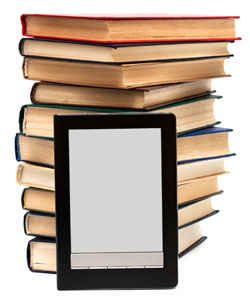 "Have a conversation with the author as you read. Underline passages that catch your fancy. Or, if you are reading a borrowed book or a library copy, copy favorite phrases into a notebook. Consider your underlines and notes as the equivalents of standing ovations at a musical performance. Know that a heavily notated book is one that you have taken to heart." These are recommendations from "Making Reading Sacred," an essay we wrote for S&P's books section.
"Have a conversation with the author as you read. Underline passages that catch your fancy. Or, if you are reading a borrowed book or a library copy, copy favorite phrases into a notebook. Consider your underlines and notes as the equivalents of standing ovations at a musical performance. Know that a heavily notated book is one that you have taken to heart." These are recommendations from "Making Reading Sacred," an essay we wrote for S&P's books section.
In an article for The Chronicle of Higher Education, "Secret Lives of Readers," Jennifer Howard points out that new inquiries by scholars into the history of reading are yielding some interesting information. Some book lovers create commonplace books celebrating their varied uses of published works. Others read their favorite works aloud or start reading groups. In times when paper was expensive and hard to find, some book pages became toilet paper. While many men and women flocked to libraries for things to read, others saw books as disease carriers and tried to set up book-disinfecting machines.
Today, we still worry about the wildfire spread of disease but books are no longer the villain. In "Out of Touch: E-reading isn't reading," Andrew Piper laments the latest dark cloud in the history of reading. New technology has taken away the tactility of books, the smell of the binding, and the pleasures of turning pages. He writes:
"Skimming is the new normal. With my e-book, I no longer pause over the slight caress of the almost turned page – a rapture of anticipation – I just whisk away. Our hands become brooms sweeping away the alphabetic dust before us."
We spend far too many hours in front of screens to turn to another in order to read a book. We are sure that we could create a new set of spiritual practices and rituals for e-books but for right now we are still enchanted with old-fashioned books where we can put our marks on the pages and feel the sensuous pleasure of holding a book in hand as we give ourselves up to attention, being present, imagination, meaning, openness, questing, teachers, transformation, and wonder.
